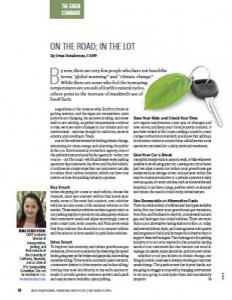By now, there are very few people who have not heard the terms “global warming” and “climate change.” While there are some who feel the increasing temperatures are a result of Earth’s natural cycles, others point to the increase of mankind’s use of fossil fuels.
Regardless of the reasons why, Earth’s climate is getting warmer, and the signs are everywhere. Rain patterns are changing, the sea level is rising, and snow and ice are melting. As global temperatures continue to rise, we’ll see more changes in our climate and our environment—extreme drought in California, snow in Atlanta, and flooding in Texas.
One of the entities invested in battling climate change, advocating for clean energy, and educating the public is the U.S. Environmental Protection Agency. One of the publications produced by the agency is “What Can You Do—On The Road,” which addresses every parking operator’s key customers: the driver and his/her vehicle. It outlines six simple steps that our customers can take to reduce their carbon footprint, which can have real effects on how the parking industry operates.
Buy Smart
When shopping for a new or used vehicle, choose the cleanest, most fuel-efficient vehicle that meets your needs. Some of the most fuel-efficient, cost-effective vehicles are also some of the smallest vehicles on the market. These smaller vehicles can have a great effect on our parking supply if operators can adequately evaluate their customers’ needs and adjust accordingly. Case in point: Smart cars, Mini Coopers, and Fiats are so small that they redefine the definition of a compact vehicle and the amount of area needed to park those vehicles.
Drive Smart
To improve fuel economy and reduce greenhouse gas emissions, drive more efficiently by observing the speed limits, going easy on the brakes and gas pedal, and avoiding excessive idling. Three words: automatic space counters. Consumers’ desires to drive smarter and reduce idling/circling time now fall directly in line with operators’ needs to provide greater customer service and quick and easy access to available, open parking.
Tune Your Ride and Check Your Tires
Get regular maintenance, tune-ups, oil changes, and new filters, and keep your tires properly inflated. If you have looked at the Green Parking Council’s Green Garage Certification Standard, you know that adding a tire inflation station is a small value-added service most operators can install for a fairly minimal investment.
Give Your Car a Break
Use public transportation, carpool, walk, or bike whenever possible to avoid using your car. Leaving your car at home just two days a week can reduce your greenhouse gas emissions by an average of two tons per year. While this may be counterproductive to a private operator’s daily revenue goals, for some entities, such as universities and hospitals, it can have a large, positive effect on demand and reduce the need to build costly infrastructure.
Use Renewable or Alternative Fuels
There is a wide variety of vehicles and fuel types available today that can lower your greenhouse gas emissions, from E85 and biodiesel to electric, compressed natural gas, and hydrogen fuel-celled vehicles. There are more than 10,000 alternative fueling stations in the U.S. today, and several federal, state, and local agencies offer grants and programs to build and increase the infrastructure to support these technologies. The challenge for the parking industry is to not only respond to the potential fueling needs of our customers but also balance our need to manage our assets, space allocation, and turnover ratios.
Whether or not you believe in climate change, one thing is certain: Business is always evolving as customer needs change. The question now lies in your hands: Are you going to struggle to cope with a changing environment or are you going to anticipate them and successfully prepare?
Irma Henderson, CAPP, is interim director of transportation, parking, and fleet services at the University of California, Riverside, and co-chair of IPI’s Sustainability Committee. She can be reached at irma.henderson@ucr.edu.
TPP-2015-10-On the Road; In the Lot

